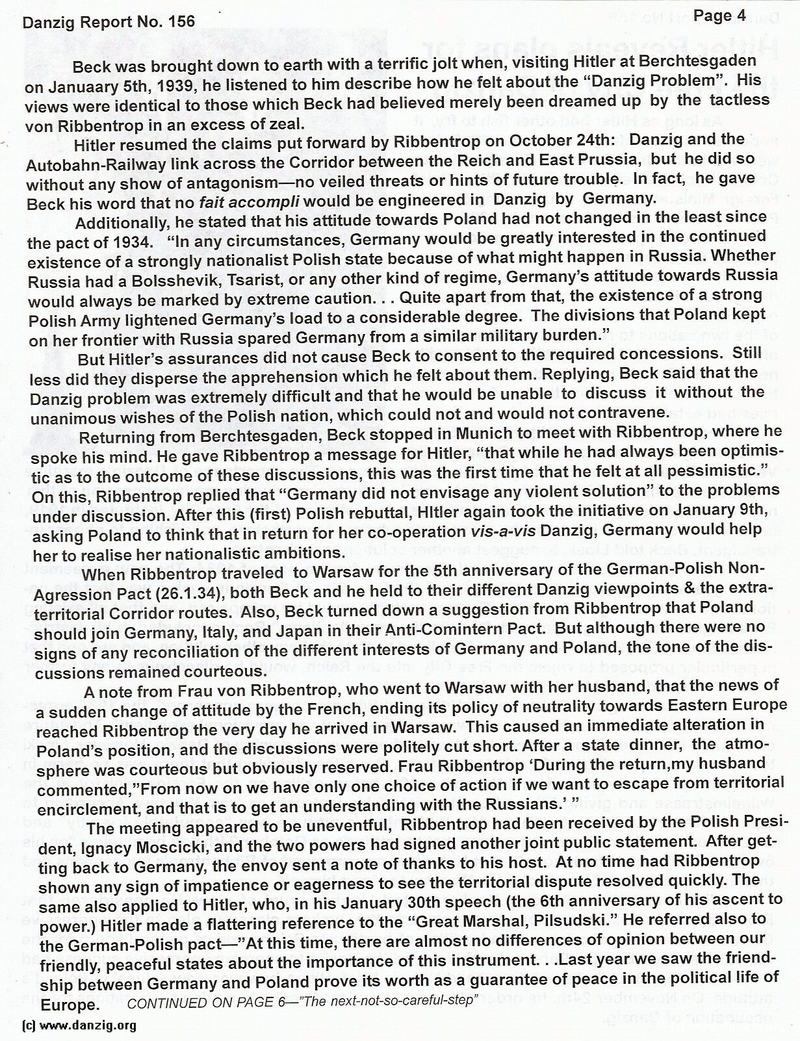
Hitler Reveals plans for the Free City of Danzig :
>> Beck was brought down to earth with a terrific jolt when, visiting Hitler at Berchtesgaden on January 5th, 1939, he listened to him describe how he felt about the "Danzig Problem". His vieuws were identical to those which Beck had believed merely been dreamed up by the tactless von Ribbentrop in an exess of zeal.
Hitler resumed the claims put forward by Ribbentrop on Oktober 24th: Danzig and the Autobahn-Railway link across the Corridor between the Reich and East Prussia, but he did so without any show of antagonism - no veiled threats or hints of future trouble. In fact, he gave Beck his word that no fait accompli would be engineered in Danzig by Germany.
Additiionally, he stated that his attitude towards Poland had not changed in the least since the pact of 1934. "I any circumstances, Germany would be greatly interested in the continued existence of a strongly nationalist Polish state because of what might happen in Russia. Whether Russia had a Bolsshevik, Tsarist, or any other kind of regime, Germany's attitude towards Russia would always be marked by extreme caution. . . Quite apart from that, the existance of a strong Polish Army lightened Germany's load to a considerable degree. The divisions that Poland kept on her frontiere with Russia spared Germany from a similar military burden."
But Hitler's assurances did not cause Beck to consent to the required concessions. Stll less did they disperse the apprehension wich he felt about them. Replying, Beck said that the Danzig problem was extremely difficult and that he would be unable to discuss it without the unanimous wishes of the Polish nation, wich could not and would not contravene
Returning from Berchtesgaden, Beck stopped in Munich to meet with Ribbentrop, where he spoke his mind. He gave Ribbentrop a message for Hitler, "that while he had always been optimistic as to the outcome of these discissions, this was the first time that he felt at all pessimistic." On this, Rippentrop replied taht "Germany did not envisage any violent solution" to the problems under discussion. After this (first) Polish rebuttal, Hitler again took the initiative on January 9th, asking Poland to think that in return for her co-operative vis-a-vis Danzig, Germany would help her to realise her nationalistic ambitions.
When Ribbentrop traveled to Warsaw for the 5th anniversary of the German-Polish Non-Agression Pact (26.1.1934), both Beck and he held to their different Danzig vieuwpoints & the extraterritorial Corridor routes. Also, Beck turned down a suggestion from Ribbentrop that Poland should join Germany, Italy, and Japan in their Anti-Comintern Pact. But although there were no signs of any reconciliation of the different interests of Germany and Poland, the tone of the discussions remained courteous. . . .
Danzig Study Group U.S.A.
Danzig Report Nr. 156 - April - May - June - 2012, Page 4.
Hits: 4015
Added: 30/05/2012
Copyright: 2025 Danzig.org

